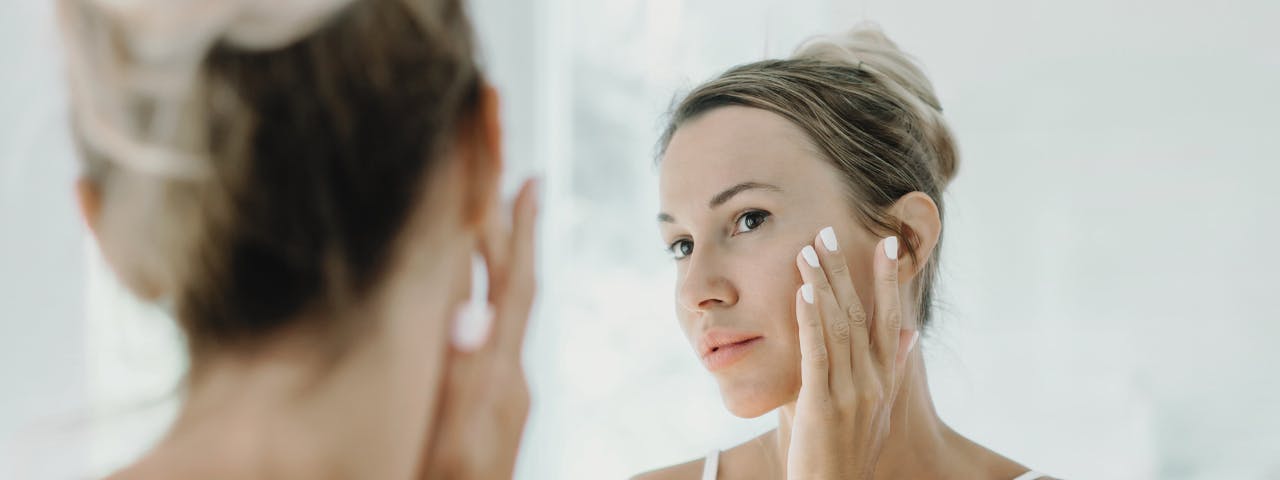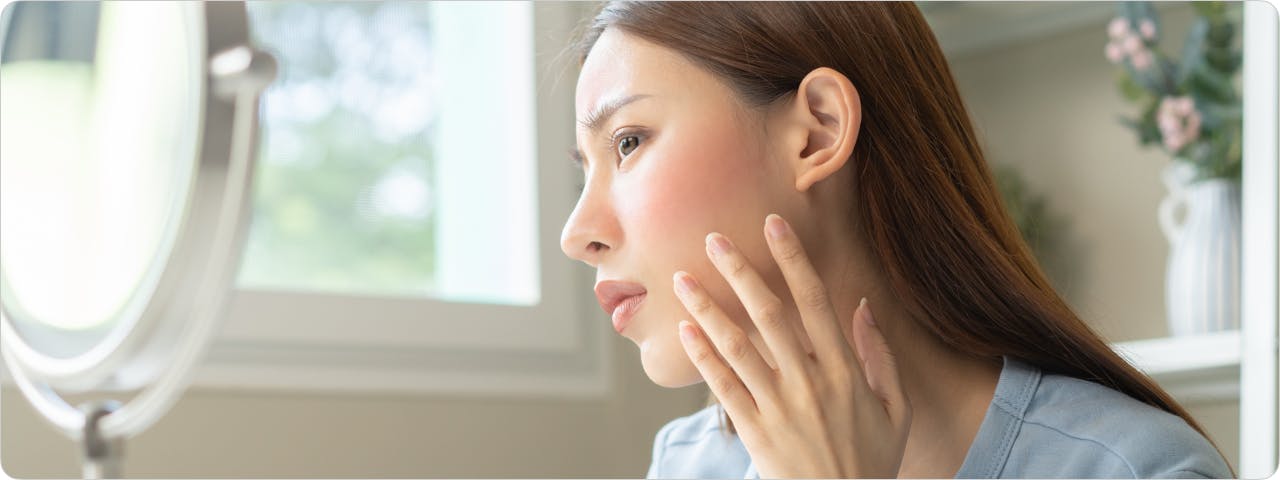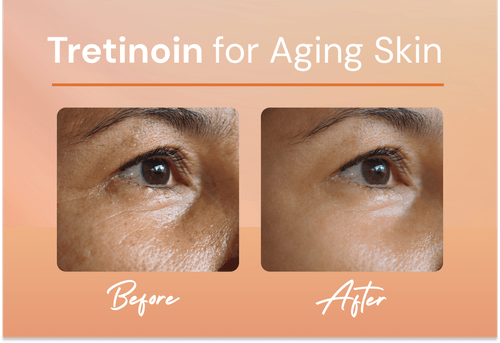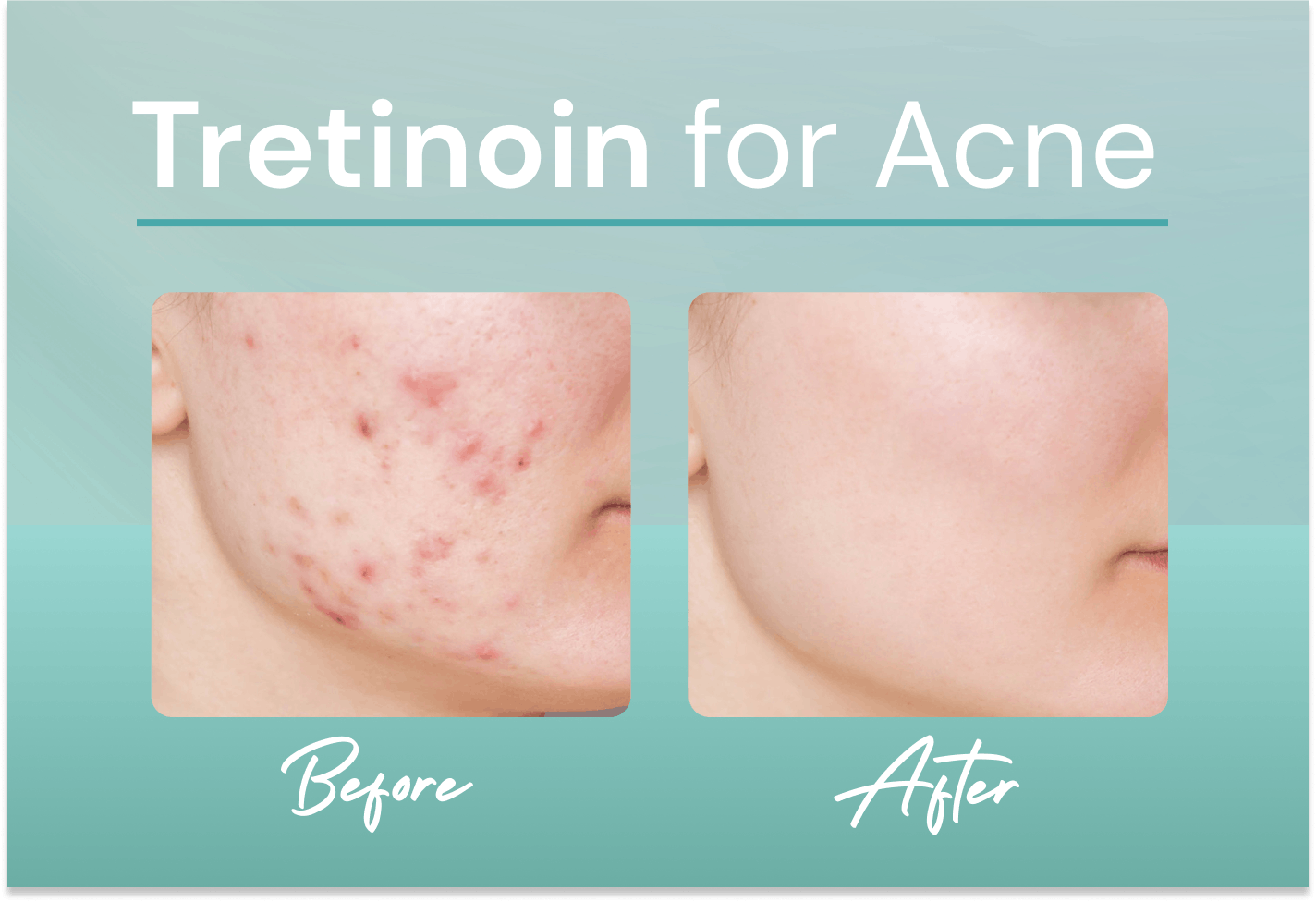If you’re reading this, you may be wondering how to get rid of rosacea or at least reduce flare ups and avoid certain triggers.
Board certified dermatologist and medical technology director of Cortina, Dr. Michael Jacobs MD, describes rosacea as “a skin condition that is characterized by redness, bumps, itchiness, and irritation of the skin.”
Although rosacea cream and other medications and treatments may be recommended by a doctor depending on the types of rosacea being treated, there are several triggers which you can do your best to avoid to prevent rosacea flare ups.
Not everyone who suffers from rosacea has the same triggers, so it is important to take the time to identify your triggers.
This post will walk through 10 common rosacea triggers as identified by the American Academy of Dermatology Association, including:
- Sunlight
- Stress
- Heat
- Alcohol, especially red wine
- Spicy foods
- Some skin and hair care products
- Some makeup
- Wind and cold
- Some medicines
- Exercise
Sunlight
Although sunlight is important for one’s health and well-being, it can also trigger a rosacea flare up.
In order to prevent rosacea skin from flaring up in the sun, Dr. Jacobs says “one of the most important things to remember is to have your skin covered and protected. Have SPF that is non-chemical, made for sensitive skin, and at least 30 SPF or higher.”
Stress
Although we sometimes can’t control the stressful situations that come our way, we can work on how we respond to them.
Dr. Jacobs notes that “having an increase in stress levels can cause overall inflammation which in turn can cause rosacea flare-ups. Controlling stress can lead to less severe flare-ups and reduce their frequency.”
The American Academy of Dermatology Association recommends that if stress is one of your triggers, you should regularly participate in an activity which reduces your stress.
Heat
Dr. Jacbos says that “sun, humidity, exercise, heated beverages, and hot climate generally can cause flare-ups. This is due to the fact that heat will make blood vessels dilate and much more prone to sensitivity. Sunburn can make flare-ups even worse as the skin is damaged and will be more prone to sensitivity, itchiness, flakiness, and a higher pain level.”
Although it is impossible to avoid heat entirely, there are precautions you can take to prevent overheating which may cause rosacea flare ups.
American Academy of Dermatology Association recommends:
- Staying in air conditioned or cool environments if you can
- Using warm instead of hot water when bathing or showering
“To be safe, limit sun exposure during the middle of the day and always wear SPF or a hat” Dr. Jacobs adds.
Alcohol
We know it could be easier said than done to cut out alcohol for some. However, if you have rosacea prone skin, you should try to steer clear from it, especially red wine (as noted by the American Academy of Dermatology Association), as much as possible as it can lead to rosacea flare ups.
“Alcohol causes blood vessels to dilate and increases the risk of rosacea. This will then make the face turn red and flushed and can cause a flare-up,” says Dr. Jacobs.
Spicy Foods
Avoid spicy foods if you’re looking to reduce rosacea flare ups. According to EatingWell.com, “spicy foods can trigger a histamine response that leads to inflammation of the skin and face. This leaves the skin looking flushed, and can even cause inflammatory bumps and pimples.”
According to a survey from the National Rosacea Society “of more than 400 rosacea patients, 78 percent said they had to alter their diet to avoid rosacea flare-ups. Three quarters of respondents said that they were affected by spices of some sort. Hot sauce affected 54 percent of those surveyed, while cayenne pepper affected 47 percent and red pepper affected 37 percent.”
Some skin and hair care products
The kinds of products you are putting on your hair and skin may cause rosacea flare ups.
According to Dr. Jacobs, “any product that is an irritant to the skin can worsen rosacea, examples of these being products that contain alcohol, fragrances, glycolic acid, lactic acid, benzoyl peroxide, among others. It is important to be familiar with ingredients that can dry out the skin and thus worsen flare-ups and harm the skin further.”
Some makeup products
If you’re someone who wears makeup regularly, it could be the reason you may be experiencing frequent rosacea flare ups.
“It is important to remember that less is more when it comes to face makeup and ensure you are using products that are hydrating so your skin can stay moisturized and help your rosacea,” says Dr. Jacobs. “If you struggle with rosacea and choose to wear face makeup, it might be best to consider mineral makeup as it is more likely to contain less irritating ingredients and be oil-free.”
Dr. Jacobs notes that “the worst products to use for rosacea-prone skin would be something with high levels of alcohol which will irritate and dry the skin, [and] glycolic acid which may be too harsh on the skin, etc.”
He also highlights the importance of patch testing your makeup, using less product and cleaning your products.
Wind and cold
According to the American Academy of Dermatology Association, cold temperatures can trigger a rosacea flareup, especially if windburn is present.
If you are in an area with a colder climate, it is recommended to:
- Cover your face with a silk scarf
- Limit the amount of time you spend outside
Some Medicines
If you take certain medications regularly, they could be triggering rosacea flare ups on your skin.
However, “if medication is causing or worsening flare-ups to where they are unmanageable, do not stop taking medication and seek help from your doctor to establish a new course of action. It is also important to get diagnosed quickly to manage symptoms,” says Dr. Jacobs.
Furthermore, “Some medications and supplements can often trigger rosacea and make flare-ups worse such as vitamin B3, vitamin D, some steroids, etc. If you are taking vitamins, supplements, or other medications, check with your doctor and ensure that this will not trigger or cause a flare-up” says Dr. Jacobs.
It is important to find rosacea cream and other medications that are customized for your skin as everyone is different.
Exercise
Almost everyone knows exercise is great for staying healthy. However, exercise brings an increased body temperature which may trigger a rosacea breakout.
The American Academy of Dermatology Association recommends:
- Exercising in air conditioned environments
- Opt for lower intensity workouts
References
Ball, J. (2021, June 9). The Best & Worst Foods for Rosacea. EatingWell. Retrieved September 27, 2022, from https://www.eatingwell.com/article/7906387/best-worst-foods-for-rosacea/
Hot sauce, wine and tomatoes cause flare-ups, survey finds. Hot Sauce, Wine and Tomatoes Cause Flare-ups, Survey Finds | Rosacea.org. (2005). Retrieved September 27, 2022, from https://www.rosacea.org/rosacea-review/2005/fall/hot-sauce-wine-and-tomatoes-cause-flare-ups-survey-finds
How to prevent rosacea flare-ups. American Academy of Dermatology. (n.d.). Retrieved September 27, 2022, from https://www.aad.org/public/diseases/rosacea/triggers/prevent
Triggers could be causing your rosacea flare-ups. American Academy of Dermatology. (n.d.). Retrieved September 27, 2022, from https://www.aad.org/public/diseases/rosacea/triggers/find



